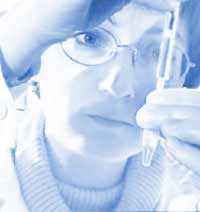 |
Head of the Laboratory - Doctor (physical and mathematical sciences), Prof. Zasedatelev Alexander Sergeevich.
(Deputy Director of EIMB RAS and Head of the Chair of Molecular Biophysics of Moscow Institute of Physics and Technology)
tel.: 8(499)135-98-00
|
|
|
| |
 |
Deputy Head of the laboratory
PhD (biology) Mikhailovich Vladimir Mikhailovich
tel.: 8(499)135-11-77
|
|
|
 |
Group of analysis of pathogenic bacteria and viruses
PhD (biology) Gryadunov Dmitry Aleksandrovich
tel.: 8(499)135-98-46
|
|
|
| |
 |
Group of human genome analysis
PhD (biology) Nasedkina Tatiana Vasilievna
tel.: 8(499)135-62-59
|
|
|
 |
Protein microchips group
PhD (chemistry) Rubina Alla Yurievna
tel. 8(499)135-99-80
|
|
|

